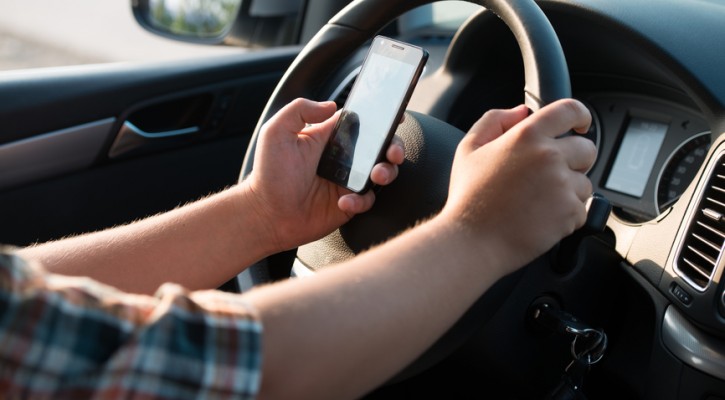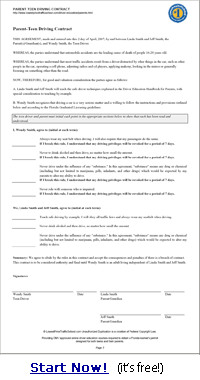Tag Archive: Teen drivers

National Teen Driver Survey Highlights Distractions on the Road
February 15, 2007
It has been said time and again, that inexperience is the number one reason teen drivers and their passengers are at risk of injury or death as a result of car accidents. A combination of immaturity, inexperience, and indifference all add to the problem. Teen drivers haven’t had the opportunity to learn which distractions are dangerous when behind the wheel, and the consequences of letting those get in the way of safe driving.
When the community understands why teen drivers act the way they do behind the wheel, educating them becomes a whole lot more productive. Therefore, studies are done nationwide to determine the safe and risky habits of teen drivers and their passengers.
One such study, sponsored by Children’s Hospital of Philadelphia and State Farm Insurance Company, asked teens what actions performed during driving were unsafe. You might be surprised by some of their answers.
According to the National Teen Driver Survey, which gathered scientific data on more than 5,600 high school students, teens reported seeing the following distractions taking place at least some of the time:
- 93% said they see peers riding with teenage driver, who are often singing, bouncing in their seat or acting wild.
- 92% reported seeing teen drivers speeding.
- 85% reported loud music from cars of teen drivers.
- 79% said they see teens sing and even dance while driving.
- 76% said they see teens drive while struggling with negative emotions, such as failing grades or relationships.
- 53% said they see teens using hand held games and listening devices or sending text messages while driving.
- 38% said they have seen teens drive after smoking marijuana.
With distractions such as singing, dancing, or dealing with life’s problems, it’s easy to see why auto accidents are the leading cause of deaths for teen drivers. We all know how hard it is to drive while just changing the radio station, let alone holding and pushing buttons on a cell phone or mp3 player. Teen drivers need to know these distractions can be deadly, and hopefully this study combined with quality driver education classes will bring this issue to light.
Stiffer Penalties for Reckless Teen Driving
February 6, 2007
Former Massachusetts Governor Mitt Romney gave a gift to Marion Emslie earlier this month, just before leaving office. Emslie’s daughter, Talia, was killed when she was 15, while she was a passenger in a car that ended up in a high-speed chase. Local government was uninterested in discussing factors that led to Talia’s death, and it became something that wasn’t talked about. However, Talia’s mom continued to fight on her behalf for stronger penalties for teen drivers who engage in risky behavior behind the wheel.
Emslie noted in a news article that come prom time, schools talk to their students about driver education 101 topics such as the dangers of drinking and driving, and about the importance of wearing a seatbelt, but the make no mention of speeding. Though Massachusetts enacted graduated licensing laws in 1998, Emslie felt more enforcement and education was needed to save lives.
The bill signed by Romney requires teen drivers with a learners permit to log more hours behind the wheel, and adds stiffer penalties for reckless driving, including speeding and drag racing. Emslie links speeding with the number one cause of teen deaths in auto accidents. Among the penalties outlined in the new legislation include: a 90-day permit suspension for speeders, a $50 fine, and an additional fine of $10 for every mile the teen driver is over the speed limit. These hefty fines will certainly make teens think twice before driving recklessly. In addition, if the teen driver is caught a second time, they would face suspension for one year, as well as an additional fine.
Emslie is not sure yet if the bill will save lives, though she is positive it will have an impact on how teen drive. She is also no doubt happy that she has been able to get the government to finally accept that more needed to be done to protect Massachusetts’ teen drivers. For Thalia, the laws come a little too late, though her peers now have a better chance at survival.
Photo: Associated Press
A Few Good Teen Driving Resources
January 9, 2007
Studies have shown that parents have a lot of influence over their teens driving decisions, which has put a lot of responsibility back on them for keeping teens safe on the road. Thankfully, there are many resources available to help parents who may need some additional instruction on how properly to coach their new teen driver. Parents themselves often engage in some risky driving behavior, and a recent Liberty Mutual report showed that teen drivers mimic their parent’s behavior. Perhaps parents need to pay close attention to the available safety resources as well.
Liberty Mutual and RADD, or “The Entertainment Industry’s Voice for Road Safety,” formerly known as Recording Artists Actors & Athletes Against Drunk Driving, have teamed up to produce a teen driving safety kit available through Liberty Mutual offices. The package, “The Road Ahead: Stay Safe at the Wheel,” includes a video, family discussion guide, and safe driving pledge.
The video is quite an eye-opener. Candid interviews with teens, and their experiences with risky driving, and its consequences should make all teens realize we are not immune to these types of disasters. However, even the small portion of the video on the Liberty Mutual website showed teens admitting that, despite knowing the risks, they still feel that it won’t happen to them.
Also a part of the video is segments from RADD’s own video, “SMASHED: Toxic Tales of Teens & Alcohol.” The title enough is to scare you into driving straight. A documentary created by HBO Family, “SMASHED” is filmed at the University of Maryland’s Shock Trauma Center, following real case studies of teens in severe auto accidents relating to drugs or alcohol. The documentary follows their progress and makes a very strong statement about the reality of drinking and driving.
“The Road Ahead” by Liberty Mutual can be requested by calling 1-800-4-LIBERTY, and other teen driving resources are available on their website. “SMASHED” is available on RADD’s website, where you can also find valuable information about the entertainment’s industry help in this cause.

New Teen Driving Guidelines Issued by American Academy of Pediatrics
January 2, 2007
Parents, law enforcement officials, and communities nationwide have put their efforts into curbing risky teen driving, and now doctors are showing their determination to end teen fatalities as well. Deaths due to auto accidents are the number one killer of teenagers, and the AAP goes a step further to detail that highway crashes kill about 5,000 16-20 year olds each year, and two-thirds of those are male. About half a million teenagers are injured in such accidents.
Obviously, teenage drivers need some help when it comes to being behind the wheel. Driver education courses and behind-the-wheel training may educate a driver on the do’s and don’ts of the road, but they do not give teens the experience they need to know what they do (and don’t do) to put themselves at risk. This is where parents come in, and the AAP has issued some guidelines for pediatricians to help parents set rules for their teens when they are behind the wheel.
The AAP suggest doctors educate parents and teens about risky behaviors including being distracted by food, cell phones, or other passengers, and encourages doctors to counsel young drivers on the dangers of drinking (or doing drugs) and driving. Parents are encouraged to set rules, as well as monitor the vehicles in which the teen will be riding or driving.
Also, pediatricians support a “safe-ride” agreement between parents and teens. A teen agrees to call their parent for a ride if they (or their driver) are impaired, and the parent agrees to withhold judgment and drive their teen home. The AAP even offers a sample contract that can be tailored for parents and their teens, including conditions under which they will not drive, and consequences that will take place if rules are not followed.
It’s great that doctors have taken the oath to save lives a step further by being proactive in the cause of teen driving safety. Teens cannot be reminded enough how dangerous the road can be, and hopefully hearing it from all of the community will make a difference. If it at least saves one young life, it will be a huge difference.
Nearly Half of All Teen Driving Fatalities Caused by Speeding
December 29, 2006
Have you sped while driving? Sure, who hasn’t, right? Well according to statistics, if you’re a teen driver, you are putting yourself at a high risk for a car accident. And if you’re a parent of a new driver, you should know how your teen defines speeding. One study in California showed that most teenage drivers defined speeding as driving in the area of 90 mph or more. Driving 65 in a 55 zone was not considered speeding by them. That’s a scary thought.
What’s worse is that teenagers do not realize the consequences of speeding. A 2005 study by the Allstate Foundation found that about half of all teenage fatalities resulting from car crashes were caused by speeding. However, all over the nation, teens are being pulled over for excessively speeding for reasons that they believe are important, but they are instead putting lives at risk, including their own.
Recently, an online newspaper reported that a 16-year-old boy was pulled over for driving 142 mph at about 12:40 a.m. Officers believe this is the fastest speed ever recorded on their roads, as most cars don’t even go that fast. The teen’s excuse for speeding? He was late getting home, past his curfew, and afraid his parents would get angry. In the same community a few months prior, a 17-year-old girl was pulled over for driving 101 in a 30 mph zone. Again, it was late night, and she was in a hurry to get home.
What are these drivers thinking? Obviously they don’t realize the true dangers of speeding. They feel invincible. Sadly, many teens who feel this way don’t make it home to their parents, not even late. Wouldn’t it be better to just make it home late, and alive, then not at all? Hopefully teens can realize that speeding is not the answer, and that perhaps open communication with their parents is a good start to driving safety. Next time you’re going to be out past your curfew, call your folks and let them know you’ll be late, and home safe.
